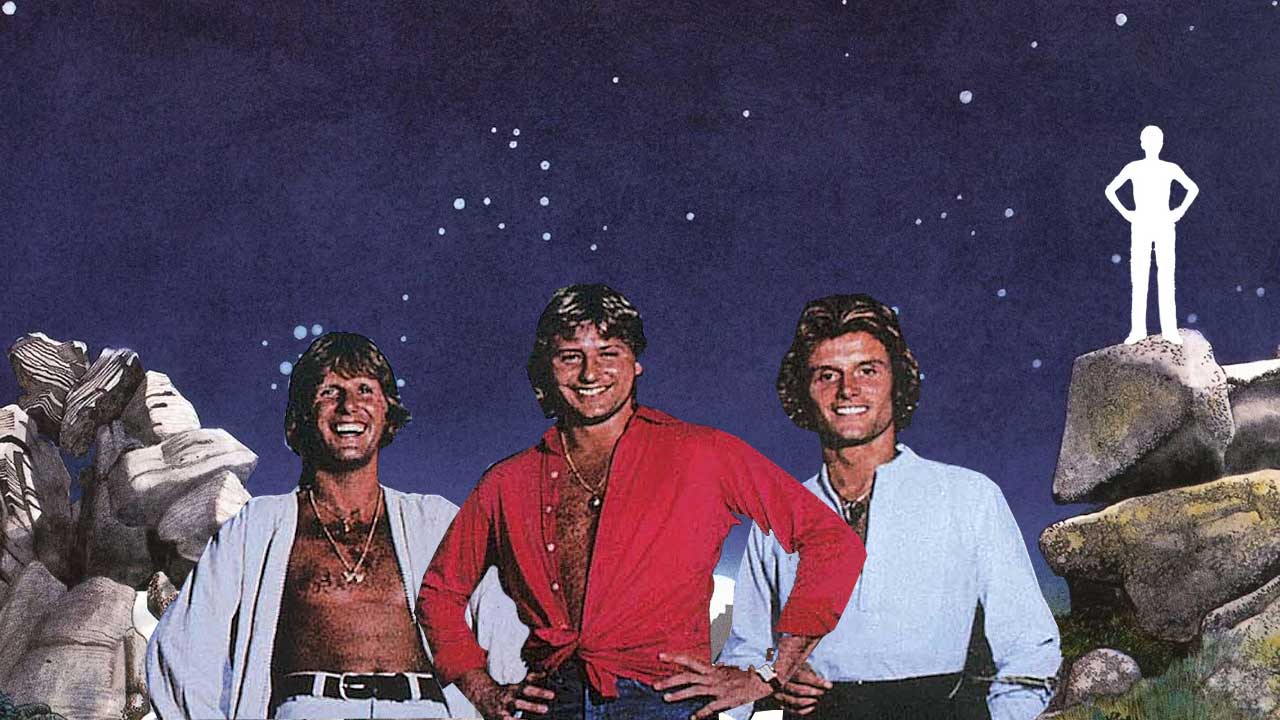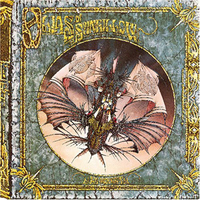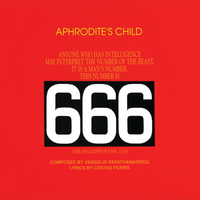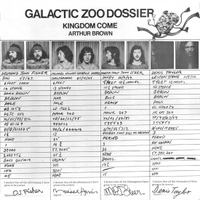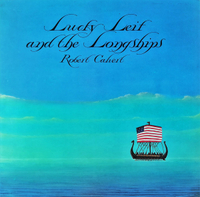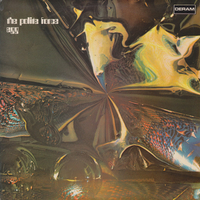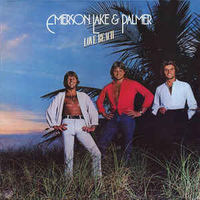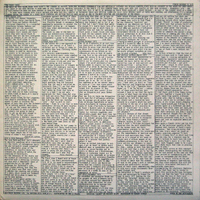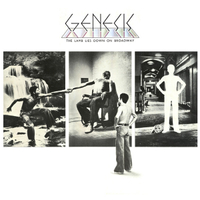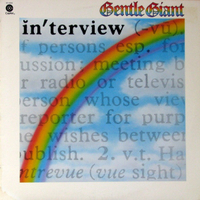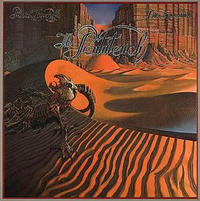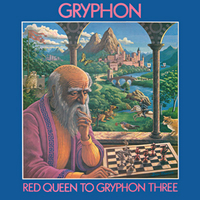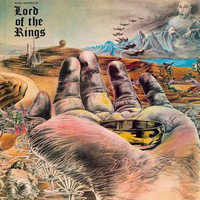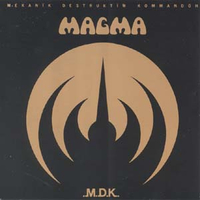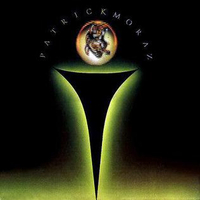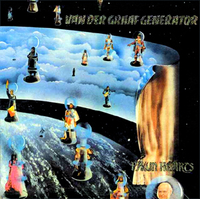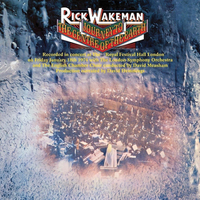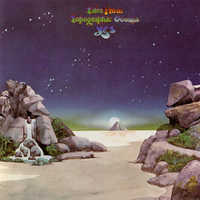Invented languages. Suicidal lighthouse keepers. Viking explorers. Chess games set to medieval folk music. Demis Roussos. Prog and outlandish concepts have always gone hand in hand.
So we've delved into our record collections and unearthed a host of classics and curios. And we've made a Spotify playlist comprised of the longest songs* from each album, which, all things considered, may well be actual Peak Prog.
*apart from one, which isn't on Spotify.

Jon Anderson - Olias Of Sunhillow (1976)
Classic Rock readers will know we hold this in high esteem. In fact, in issue 90 we said it was possibly the greatest ‘lost’ concept album of all time. To remind you of the story: Olias… concerns an alien race and their journey to a new world after their old one explodes. To transport his fellows into space, the central character Olias (for it is he) builds a ship called Moorglade that resembles the Cutty Sark crossed with a giant moth.
Then a geezer called QoQuaQ unites the four tribes of Sunhillow so all and sundry can join in the exodus. The ever-winsome Anderson even sings some lyrics in his own, invented language. To wit: ‘Radan atto raddan atto stou to mutto sha go teka sha go teka dei.’ As preposterous as they come.
Aphrodite’s Child were originally a Greek flower-power pop band who seemed unlikely to trouble the world. But then in 1971 they released this horrifyingly overblown prog concept album based loosely on the Apocalypse Of St John from the New Testament.
Madder still was that firing them on creatively was current new-age synth bore and one-time colleague of Jon Anderson, Vangelis, and vocal partner Demis Roussos (later known a superatar, dress-wearing, eunuch-voiced Euro warbler). If Hell exists, half of this album is what it might sound like. The remainder is hypnotically engaging, nay, mind-blowing prog rock.
Arthur Brown's Kingdom Come - The Galactic Zoo Dossier (1971)
Arthur Brown has always combined shock theatrics and verminous musical experimentation in an uneasy mental balancing act. Kingdom Come were so ahead of their time, no one knew what to make of them.
This was the first of three albums from Arthur’s post-Crazy World band. Synths railed against guitars, and Brown himself decided to take the rebellious, uncertain nature of the era and interpret it on record. This was the folk rock of student riots and toppling mores. Unnerving, yet strangely appealing
Robert Calvert - Lucky Leif & The Longships (1975)
The late Robert Calvert’s second solo album, Lucky Leif… is based on the story of Leif The Lucky, son of Erik The Red, who discovered America centuries before Christopher Columbus.
With spaced-out guest musicians from The Pink Fairies and Hawkwind, you’d expect this to be full of head-whirling jam sessions. But in fact the 11 tracks are concisely rendered and feature a wide variety of musical styles; there’s even a Beach Boys/Barbra Ann piss-take on Lay Of The Surfers, with its refrain of ‘bar-bar-barbarians’. No wonder Brian Wilson went mad.
How the hell do you explain Egg? Ludicrous, verging on pompous, as much as these Brits tried to avoid accusations of musical arrogance they were guilty as charged. The Polite Force featured one side devoted to a four-part composition called Long Piece No.3.
Elsewhere, the combination of brass, organ and tone generator (why doesn’t anyone use these any more?) makes for insanity on tracks like Contrasong, which disappear up their jazzy pretensions. Is it any wonder that their label initially refused to release it? A glorious example of being up your own arse.
Emerson, Lake & Palmer - Love Beach (1978)
For all their magnificent prog triumphs – Tarkus, Trilogy, Brain Salad Surgery et al – ELP also had some terrible lows. As if the track When The Apple Blossoms Bloom In The Windmills Of Your Mind, I’ll Be Your Valentine (on Works Vol. II in ’77) wasn’t bad enough, the band reached their nadir a year later with the ridiculous Love Beach.
Released at the height of punk, and with the three members dressed like The Bee Gees on the cover, Love Beach contained several ill-advised stabs at commercial pop plus a tragic wedge of prog-rock pathos, Memoirs Of An Officer & A Gentleman. More than the efforts of Johnny Rotten and Joe Strummer, Love Beach was the thing that killed prog in the 70s. ’Nuff said.
Faust - The Faust Tapes (1973)
Kraut rock, if you’ll forgive the World War II terminology, is a perilous minefield. We scratched our heads long and hard trying to decide which album to include here. Can’s Tago Mago, Neu!’s self-titled Neu!, Amon Düül II’s Phallus Dei… this is supremely scary sonic territory.
But in the end we plumped for The Faust Tapes purely because we remember buying it for 48p (the cost of a single) when it came out on Virgin in ’73. Because of the cheap price it sold 50,000 copies; it’s widely regarded as the record that brought avant-garde music into people’s living rooms. And immediately sent everyone down the pub. Little more than a madcap collection of home recordings, this is a gruelling cacophony. It’s barely music. It’s on the outer limits of prog.
Genesis - The Lamb Lies Down On Broadway (1974)
The mother, father, brother and second cousin of all album concepts is the simple tale of a New York kid who is turned into a fly on a car windscreen (novel beginning), then heads off on an epic journey during which his best day includes getting a topless massage from a trio of snake-babes (who he later eats).
His worst involves being castrated (without an anaesthetic) and being forced to join a colony of ‘slippermen’ who carry their balls around their necks in plastic tubes. Definitely not one for The Bumper Book Of Bedtime Stories. The music, by the way, is brilliant.
Gentle Giant - Interview (1976)
Amazingly Gentle Giant started life in 1966 as Simon Dupree & The Big Sound. They gained a hit with Kites, a psychedelic pop classic. But GG were much more experimental. Not to say convoluted. They mixed classical and jazz influences, intricate vocals and highbrow lyrics. Their song structures were mangled, the only relief coming from an occasional burst of rocktastic energy.
We could’ve included any one of their dozen or so albums here. But we’ve chosen Interview because it’s structured like a mock confab with a rock-magazine writer. The band make barbed comments about the music biz and complain about the inane questions they get asked by journos (who used to call them ‘Genital Gnat’). Later, vocalist Derek Shulman would become an A&R exec in the US, signing the likes of Cinderella and Kingdom Come!
Dave Greenslade - The Pentateuch Of The Cosmogony (1979)
Punk rock – year zero, 1976. Three years on, unbowed, a former Colosseum and Greenslade mainstay offers up a lavish solo keyboard extravaganza with nary a hint of melody or song. Wrapped in a lavish hardbound book with futuristic artwork courtesy of Patrick Woodroffe, it even went so far as to create its own language (progsperanto, anyone?).
Laughing aside, it is a surrealistic synthesised tour de force of pomp and creativity that made a mockery of Johnny Rotten and Co.’s attempts to do away with suchlike. Just as well the revolution wasn’t televised for too long, then.
Gryphon - Red Queen To Gryphon Three (1974)
Crumhorns. Bassoons. Yes, Gryphon were different. Very different. Steeped in the medieval traditions of English folk music, this was their third album, and the happy troupe really gave themselves a dose of hey-nonny-nonny diarrhoea by trying to develop a concept based on a game of chess.
Hence tracks called Opening Move and Checkmate. There are only four ‘compositions’ here; each is stretched to the point of incredulity, held together only by an utter faith in the lunacy. This is renaissance rock taken to such an extreme that it makes Blackmore’s Night sound perfectly normal.
Bo Hansson - Music Inspired by Lord of the Rings
As anyone who’s read JRR Tolkien or seen the films will know, there’s nothing small-scale about Lord Of The Rings. Yet Swedish keyboardist Bo Hansson’s interpretation is so restrained and underwhelming, he might as well have been composing the score to an episode of Where The Heart Is.
Despite the potential drama of songs such as Lothlorien and Shadowfax, Hansson witters away on his Moog, evoking none of the atmosphere of the books whatsoever. Precious? Not in the slightest. Later, Hanson would release an album inspired by Watership Down. Hobbits, rabbits… it’s all the same to us.
The debut from a British band who got so caught up in trying to combine free-form jazz, prog rock and dissonance that, at times, they lost the plot.
Tracks like Nirvana For Mice and Extract From With The Yellow are ridiculously self-absorbed. To go with the album’s title, they used a photo of a sock on the cover. Leg End, geddit?
Magma - Mekanïk Destruktïw Kommandöh (1973)
Christian Vander concocted a completely new (untranslatable) language for his experimental band, Magma. The language was Kobaian, spoken by the people of Kobaia, a planet of spiritually enlightened humans who left Earth and formed a new civilisation.
This album is apparently a sci-fi story about doomed Earth people and a good-guy visionary who comes to their aid – but unless you speak Kobaian, you’ll have a bit of a problem following it. Rolling Stone called it the 33rd best French album of all time.
Patrick Moraz - The Story Of I (1976)
Two years earlier Moraz had coped admirably with the unenviable task of replacing Rick Wakeman in Yes for Relayer. Moraz would later resurface in The Moody Blues on their Octave tour and Long Distance Voyager album. But in 1976 the Swiss keyboard whiz hit the solo trail.
Based around the story of a group of hotel guests who decide to sell their souls in the pursuit of pleasure, and enlisting such musical greats as Ray Gomez (guitar) and Alphonse Mouzon (drums), The Story Of I intertwined a host of world music sounds with Moraz’s own prodigiously progressive inclinations. It proved you didn’t have to go bankrupt performing on ice to be a keyboard maestro.
The Nice - Five Bridges (1970)
When Keith Emerson’s The Nice prepared to release Five Bridges, anticipation was at fever pitch. It was widely thought to be about The Five Bridges Of Kavorgh that span the Rivulets Of Jokakaq in the Galaxies Of Gloom.
However, the truth was much more prosaic, and it turned out to be a piece of music commissioned for the Newcastle Arts Festival. Bassist/vocalist Lee Jackson was a native Geordie and his lyrics were full of childhood reminiscences of his home town, centring on the five bridges that traverse the river Tyne. Wye aye man, it even reached No.2 in the chart.
Prog has always been a big deal in Italy. Maybe it’s because they like opera so much. Van Der Graaf Generator, for example, were like gods in Italy. Premiata Forneria Marconi were (indeed, still are) an Italian prog band who gained a pizza the action outside their homeland: Greg Lake liked ’em so much he got them a deal with ELP’s Manticore label, and this album was released with English vocals under the title Photos Of Ghosts.
Reminiscent of Genesis circa Selling England By The Pound, PFM prove that prog isn’t the exclusive province of posh public schoolboys.
Van der Graaf Generator - Pawn Hearts (1971)
VDGG are now ‘cool’ thanks to John Lydon’s professed fanship of Peter Hammill, the band’s leader cum tortured poet. Pawn Hearts is a discordant masterwork centred around the 20-minute A Plague Of Lighthouse Keepers.
“The song deals with the guilt felt by a lighthouse keeper and his complexes about seeing people die and not being able to help,” Hammill once said. “In the end he either kills himself, or he rationalises it all and can live in peace.” With extra weirdness supplied by Lemmings and Man-Erg, Pawn Hearts sums up all that is glorious and bewildering about VdGG
Rick Wakeman - Journey To The Centre Of The Earth (1974)
Yes’s white-cloaked keyboard king released a ‘terrible trilogy’ of albums in the 1970s. Sandwiched in-between The Six Wives Of Henry VIII and The Myths & Legends Of King Arthur & The Knights Of The Round Table was Journey…, the most horrible of the lot.
Based on the Jules Verne novel, it was performed live with the London Symphony Orchestra and the English Chamber Choir, and features David Hemmings as narrator. It’s rotten to its molten core. But it was also a No.1 album!
Yes - Tales From Topographic Oceans (1973)
Yes had been on a roll up to this point with prog tours de force such as The Yes Album (1971), Fragile (also ’71) and Close To The Edge (’72). But a bloated triple live effort, Yessongs, was a grim portent of things to come.
Tales… was released as a double vinyl album – with only four tracks on it! It was somehow both brilliant and stupefyingly boring. Yes had lost the plot and keyboard man Rick Wakeman quit after the Tales… tour. He showed his disdain by eating curry on stage during the most boring moments.
Classic Rock Newsletter
Sign up below to get the latest from Classic Rock, plus exclusive special offers, direct to your inbox!
